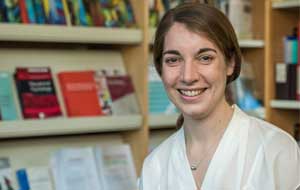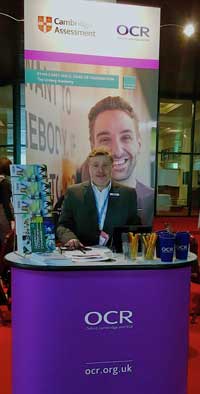Joanna Williamson and David Summers encouraged critical thinking and highlighted how paying attention to research and reflecting on the basics leads to good assessment design at this year's UCAS Annual Admissions Conference in Newport, Wales.

Students with Applied General qualifications have been progressing to Higher Education (HE) for many years. New labels and new requirements around external assessment have, however, introduced a number of recent changes. At this year’s UCAS Admissions Conference, OCR collaborated with Cambridge Assessment’s Research Division to offer a workshop for HE admissions staff. We aimed to improve their knowledge and understanding of Applied Generals, and, on our part, better understand Applied Generals from the perspective of HE. We also wanted to encourage some critical thinking – What are the assumptions behind practices? Do these practices serve students and Higher Education Institutions (HEIs) as well as they could?

David (pictured right manning OCR's exhibition stand) began the workshop by outlining recent legislation on Applied General qualifications and explained the role and purposes of the
two Cambridge Technicals suites. I then introduced relevant research on internal and external assessment methods (e.g.
here), and on progression to HE. We demonstrated how Cambridge Assessment’s commitment to
good assessment design means paying attention to research and to the basic principles. We invited participants to step back and reflect on the basics too – Why do we assess learners? What do we need and want from assessment results? What do students need?
We found the workshop format an effective way to achieve dialogue between staff from different HEIs, and between the admissions teams and ourselves. The workshop participants shared important observations, perceptions and challenges regarding Applied Generals and HE admissions. It was particularly helpful that the participants represented a wide range of disciplines – some applied, some technical, some less so - and also a wide range of HEIs – some highly selective, some less so, and from across the UK, not just England. The diversity of experiences helped underline our themes of recognising diversity and thinking about assessment in the context of purpose.
Thinking critically about access to HE means considering issues as diverse as the technicalities of assessment design, school funding, and the HE market. The workshop format allowed us to share our expertise on assessment whilst fully acknowledging the complexity of HE access overall. We were grateful to the participants for responding to this with highly engaged discussion, and the recognition of important shared goals and values.
Joanna Williamson
Research Officer, Cambridge Assessment